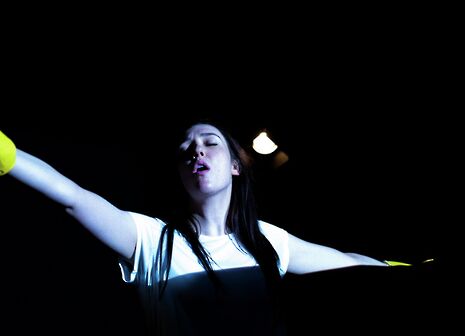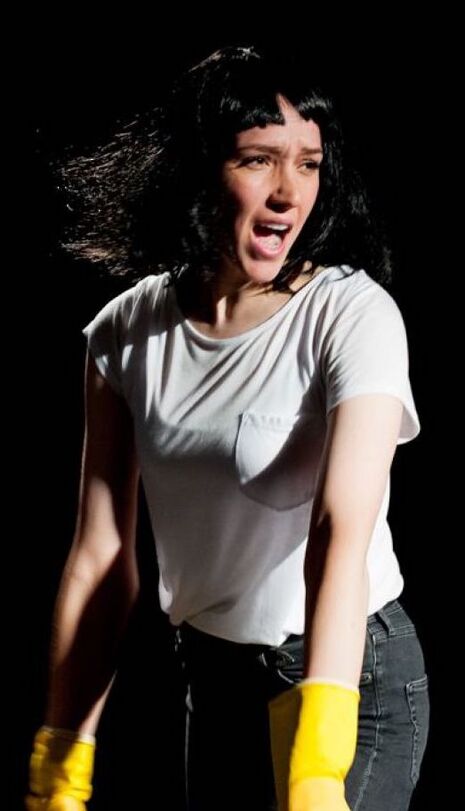Judge Judy’s Buzz World, at the Camden Fringe
Theatre editor Mimi Robson speaks to Rachel Tookey about transferring her award-winning play to a London stage

Rachel has been showcasing her work, Judge Judy’s Buzz World, at the Camden Fringe this summer. Judge Judy won the 2016 Harry Porter Prize and was performed at the ADC last term. I managed to catch up with her one morning to discuss some of the changes she has had to make for the transition, and the challenges she has encountered. Rachel sounded relaxed, and seemed to have been enjoying the Camden Fringe. She described it as fun, and noticeably different from working in Cambridge – specifically with regards to working with student actors and directors. So far, responses to the play have been resoundingly positive; it was even listed as one of the ‘top five things to see at Camden’ this year by reviewers who saw Rachel’s performance at Edinburgh last year.
I asked her how the experience compares with Cambridge: “[In London] you get people from a huge variety of ages and different backgrounds, it’s a bit more intimidating knowing that your work is being judged by the general public. It feels like you’re putting yourself out there.” She emphasises that Camden is a cheaper and more low-key alternative to the Edinburgh Fringe, but that above all she is appreciating this opportunity to showcase her work. As she has demonstrated in both Cambridge and Edinburgh, Rachel is clearly well-versed in the trials of taking a performance to a stage. She has, however, appreciated the greater intimacy that the Camden Fringe affords.
I asked her if she had written the play with a particular space in mind: “No, not really, I guess I wrote it for the Harry Porter Prize, at the ADC, but it’s the sort of play that can be done in a lot of different spaces. At the moment we’re performing in a black box theatre, and I guess it’s given it a different tone, but it’s been quite fun playing with that.” Narrative and characterisation are key interests within Rachel’s writing of Judge Judy, and what is clear when she discusses these aspects is the thought that has gone into them.

Judge Judy’s ADC run received glowing reviews from student newspapers in Cambridge (Varsity described it as ‘funny...subtle, complex and incredibly dark.’) That said, some points of improvement were also suggested – mostly technical. I wondered how she had responded to these suggestions in the second run: “I think I tend to take it with a little pinch of salt because you’ve got to remember that it’s just one person’s opinion. I go back and think: ‘why did you want to do it in that way? Why did you think that was a good idea?’”
Rachel also spoke about her experience of taking a show out of the Cambridge bubble: “I realised that no one cared what Camdram credits I had anymore, it was a lot more about: what have you done? What shows have you taken to places? How interesting are the ideas for your shows?”
Rachel was fortunate enough to have received funding from the Arts Council England, allowing her to further develop her work. I asked her about the process of gaining funding: “It was an extremely long application form, I honestly think it took me about two weeks from starting to finishing it.” The Arts Council funding meant that she could include new elements into the production, most noticeably snippets of film and animation. It also meant that everyone could get paid “except for me, which is a little bit upsetting”, Rachel added, laughing.
She went on to explain the increased pressure and expectation that comes with Arts Council funding: “[a] lot of things you have to do for funding are about trying to draw different audience member groups, doing things like workshops, and Q&As, which you never usually do at Cambridge.” She described that it is an added level of pressure, but that she had learned a lot from the process that she might not have learned if she had merely taken a show to Edinburgh Fringe again.
The run at the Camden Fringe served as an excellent opportunity to showcase her work, invite other professionals to see it, as well as to understand the work better as a writer, with the ultimate aim of taking it on tour. Rachel continues to use her focus, drive, and experience of the production process as integral tools to further her work.
 Interviews / ‘People just walk away’: the sense of exclusion felt by foundation year students19 April 2024
Interviews / ‘People just walk away’: the sense of exclusion felt by foundation year students19 April 2024 News / Controversy on the Cam: John’s spend almost 90 times more on rowing than other colleges19 April 2024
News / Controversy on the Cam: John’s spend almost 90 times more on rowing than other colleges19 April 2024 Theatre / The closest Cambridge comes to a Drama degree 19 April 2024
Theatre / The closest Cambridge comes to a Drama degree 19 April 2024 News / Corpus student left with dirty water for over six months21 April 2024
News / Corpus student left with dirty water for over six months21 April 2024 News / Emmanuel College cuts ties with ‘race-realist’ fellow19 April 2024
News / Emmanuel College cuts ties with ‘race-realist’ fellow19 April 2024





